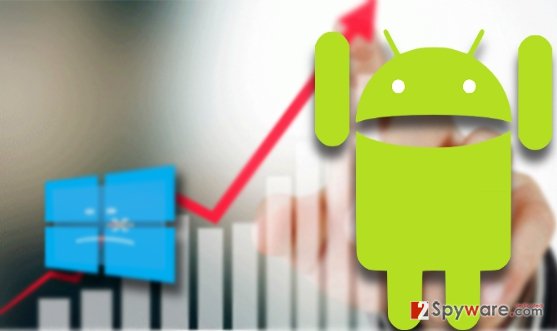Android OS is now the most popular operating system
When asked what is the most popular OS, you would probably answer –”Windows.” According to the latest StatCounter report[1], Windows OS will bathe in glory no more. You are wrong guessing that the position is taken over by Mac or Linux OS. For your surprise (or not), the new celebrity in the cyber space is Android. Due to the rapid increase in the use of smartphones, Android steadily takes over. However, some might wonder, what does this Android victory mean to the virtual community?

Meanwhile, Android is still lagging miles away from Windows when it comes to security. If the company intends to retain the top position, it must deal with its fatal security flaws[2]. Due to them, it remains an easy target for ransomware developers[3]. Likewise, the virtual community has been already struck with vivid versions of Android ransomware. Crooks, as well as companies of various ilk, seem to take an advantage of the popularity of this operating system. Chinese companies have been again caught in installing malware and spyware in cheap Android devices and shipping them to the US as well as other economically developed countries[4]. The problem is that certain countries are supplied solely by China’s production. Furthermore, this operating system is still vulnerable for advertising trojans[5]. Annoying ads are not the only bother. Less attentive users might fail to notice spyware which silently transmits personal data to a remote server. Lastly, not all antivirus utilities have their counterparts compatible with this operating system. As hackers techniques become more elaborate, users should rely more on their vigilance and cautiousness rather than fully depend on cyber security software.
- ^ Android Overtakes Windows for First Time – StatCounter. BusinessWire. Pres release distribution, EDGAR filling, XBRL, regulatory fillings.
- ^ Darla Sutrich. Android’s Inherent Security Flaws Mean Users Need To Fortify Their Mind As Well As Their Mobile. Android Headlines. Android News.
- ^ Bradley Barth. Android ransomware variant hoodwinks AV software by waiting 4 hours before striking. SCMedia. The cyber security source.
- ^ Catalin Cimpanu . 24 Chinese Android Smartphone Models Come with Pre-Installed Malware. Softpedia. Free Downloads Encyclopedia.
- ^ David Bisson. Android trojan loads ads, installs paid apps on victims' devices. Graham Cluley. Award-winning computer security news, advice, and opinion.

